Noam Chomsky’s criticisms of postmodern philosophy are often much stronger — as well as more rhetorical — than anything readers are likely to come across from people on the Right. Take this small selection of Chomsky’s words on both postmodern philosophy and postmodern philosophers: “pseudo-scientific posturing”, “cults”, “obscurantism”, “trivial”, “complicated verbiage”, “the mutual-admiration societies of intellectuals”, “crazy ideas”, “incomprehensible rhetoric”, “incoherent sentences”, “inflated rhetoric”, “self- and mutual-admiration”, “meaningless”, “irrational”…

“Postmodern philosophy is a philosophical movement that arose in the second half of the 20th century as a critical response to assumptions allegedly present in modernist philosophical ideas regarding culture, identity, history, or language that were developed during the 18th-century Age of Enlightenment. Postmodernist thinkers developed concepts like difference, repetition, trace, and hyperreality to subvert ‘grand narratives’, univocity of being, and epistemic certainty. Postmodern philosophy questions the importance of power relationships, personalization, and discourse in the ‘construction’ of truth and world views. Many postmodernists appear to deny that an objective reality exists, and appear to deny that there are objective moral values.”
[Source here. This was almost certainly written by someone isn’t a known postmodern philosopher. That explains why it’s easy to understand (despite the technical terms). Needless to say, the following essay itself isn’t really about what postmodern philosophy is or what postmodern philosophy isn’t.]
“A certain sort of analytic philosopher who dismisses as meaningless what does not instantly make sense to his shallow pate. [] I coined a name for people like him: ‘philosophistine.’ A philistine out of his depth among real philosophers.”
— American philosopher William F. Vallicella
[The source of this quote can be found here. See also note (1) at the end of this essay.]
Part One: Introduction
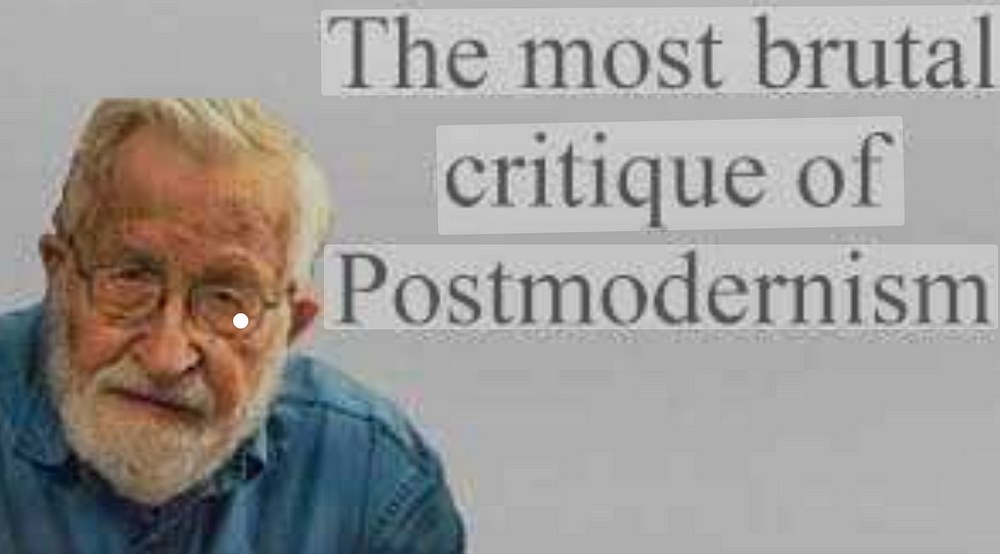
The undertext above displays an odd — although understandable — asymmetrical situation.
The practitioners and fans of postmodern philosophy are (or at least will be) far more lenient with Noam Chomsky than they are with right-wing or conservative critics of postmodern philosophy. That’s mainly because many of them will see Chomsky as belonging to the same political broad church (or big tent) as themselves. That is, they’ll see Chomsky as being — essentially(?) - on their side. (Chomsky himself states that most postmodern philosophers see themselves as belonging to what he calls “the Left”.) Thus, even though Chomsky’s words are more rhetorical, and often cruder, than other critics, they won’t be treated in the same way as the criticisms of postmodern philosophy which have come from, say, Jordan Peterson (see here), Stephen Hicks (see here), James A. Lindsay (see here), Peter Boghossian (see here), Helen Pluckrose (see here), etc.
That said, Chomsky himself mentions — favourably — the mathematical physicist Alan Sokal and theoretical physicist Jean Bricmont a couple of times, and classes them both as “political radicals”. Yet they too have received some nasty, personal and sometimes pathetic remarks from people (seemingly?) on the Left for their own criticisms of postmodern philosophy — as found in their well-known book Fashionable Nonsense: Postmodern Intellectuals’ Abuse of Science.
[The New York Times suggested (see here) that most — or even all — of those who took Sokal’s side were “conservatives”. Others said that Sokal’s book was an attack on “multiculturalism”. And, at least according to Sokal himself, the authors were compared to “schoolteachers giving poor grades” to various postmodern philosophers. To top that, one journalist even wanted to find out about Sokal’s sex life to see if that explained his (reactionary?) criticisms and positions on this issue. Some readers may also wonder what the American literary theorist and “public intellectual” Stanley Fish thinks of Chomsky’s harsh words about — and strong criticisms of — postmodern philosophy. See Fish’s ‘Professor Sokal’s Bad Joke’, also to be found in the New York Times.]
Of course, people on the Left are just as likely to dispute what is Left than anyone on the outside.
So, despite the hint at the Left’s broad church, Chomsky’s own political theories, as well as his ways of expressing them, are very different to most (or even all) postmodern philosophies and ways of writing. Yet, again, many on both sides will still see Chomsky and postmodern philosophers as belonging to the same (political) broad church…
Yet Chomsky himself (as we shall see) doesn’t (or didn’t) believe that he belonged to the same broad church as these postmodern philosophers.
Chomskyite Politics vs Postmodern Philosophy
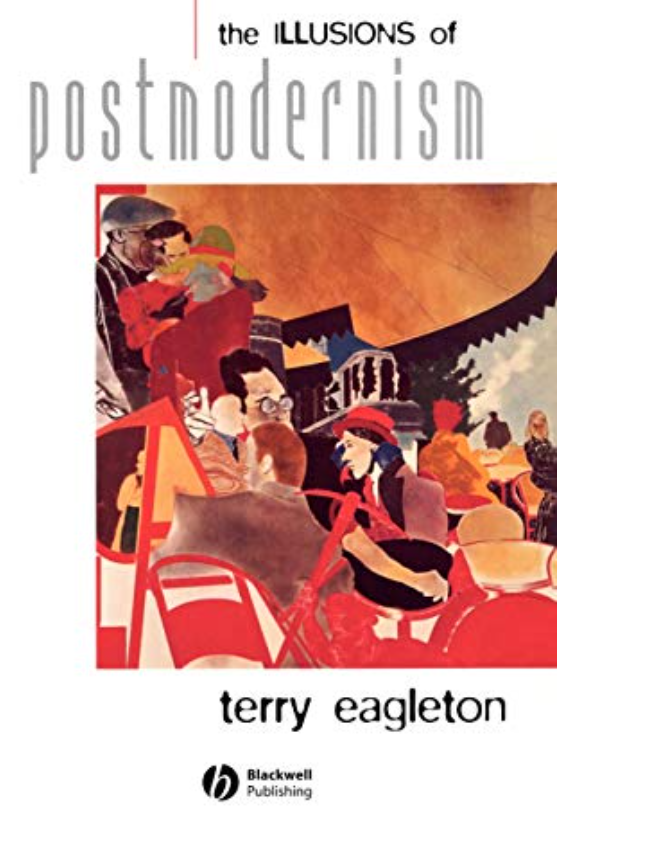
Some readers may take a sceptical stance on Chomsky’s criticisms of postmodern philosophy and say that his real beef is that postmodern philosophers don’t uphold exactly the same political ideas and theories as he does. What’s more, it can be argued that Chomsky is unhappy simply because postmodern philosophers don’t do precisely the political things that he believes they should do.
In basic terms, then, postmodern philosophers aren’t deemed to be anarcho-syndicalists and/or libertarian socialists — the two ways Chomsky has described himself (see here).
In even more basic terms, Chomsky may well be unhappy simply because postmodern philosophers aren’t… well, Chomskyites.
What’s more, Chomsky’s criticisms almost perfectly harmonise with a handful of Marxist critiques of postmodern philosophy (this isn’t to say that Chomsky is himself a Marxist), such as Professor Terry Eagleton’s book The Illusions of Postmodernism, Professor Alex Callinicos’s book Against Postmodernism: A Marxist Critique, and Professor Fredric Jameson’s book Postmodernism: or, The Cultural Logic of Late Capitalism.
Here again, the bottom line is that these Marxists are (or were) basically accusing postmodern philosophers of not being… well, Marxists.
More relevantly, the title of this essay includes the three words “pretentiousness” and “political impotence”. So readers shall see that it’s almost as if Chomsky believes that nothing pretentious and arcane can ever filter down —i.e., politically — to anyone or anything outside the universities.
This is clearly false.
We see ideas and theories from postmodern philosophy expressed — and also acted upon — all over the place. Chomsky himself tells us that this postmodern stuff can be “found mainly in comparative literature departments in the United States”. More relevantly, this stuff has filtered down from these university departments to all sorts of other places.
It’s possible that Chomsky may take a — slightly? - different view on this issue in 2023. After all, the most recent words of Chomsky quoted in this essay are from 2011…
A hell of a lot has changed since then!
What’s more, simply because Chomsky doesn’t like postmodern philosophy from a political and philosophical point of view, that doesn’t mean that he should also claim that it has no influence outside of (to use his own words) “elite universities”. Oddly enough, in some places Chomsky does give examples of situations in which postmodern philosophy has had an influence outside universities, such as his comments on two talks he gave in Israel and Palestine. That said, these events also occurred within university settings, and Chomsky was commenting on the words of an Arabic academic and an Israeli academic.
Bizarrely, in response to these criticisms of postmodern philosophy, Chomsky has been accused of “elitism” and “anti-intellectualism” by certain postmodern philosophers and their defenders. (This seems to have been Stanley Fish’s position on Alan Sokal too — as shown in the earlier section.)
Chomsky’s response to these accusations is almost too obvious to quote. However, I will quote it:
“[A]pparently it is not ‘elitist’ to stay within the self- and mutual-admiration societies of intellectuals who talk only to one another and (to my knowledge) don’t enter into the kind of world in which I’d prefer to live.”
Of course, it’s staggering that postmodern philosophers (as well as their defenders and fans) used the word “elitism” about Chomsky. Talk about the pot calling the kettle black.
Chomsky on Postmodern Philosophy’s Political Impotency
As already hinted at, Chomsky’s main problem with postmodern philosophy (he includes post-structuralism in his classification) is that it’s politically impotent.
His second problem is that it’s (to use his own word) “pretentious”.
Indeed, the first problem — at least in part — arises from the second. Then again, Chomsky also believes that even if postmodern prose were made comprehensible (or simply less pretentious), then it would still be politically impotent. And that’s primarily because it’s often made up of what Chomsky calls “truisms” and “banalities”.
This essay argues that that Chomsky is — obviously! - right about the pretentiousness of postmodern philosophy (which, again, incudes poststructuralism), but wrong about its political impotency.
It can be shown that postmodern philosophy has had numerous political impacts outside the universities… and outside Paris (as Chomsky acknowledges). In other words, what begins life as pretentious prose (i.e., in the universities), often filters down (to varying degrees) to council offices, the arts, the legal system, NGOs, certain churches, theology, parts of the media, public libraries, advertisers, social workers, psychologists, therapists, people who work for big corporations… and even people (as it were) on the street. (Some of the ideas and theories of what’s called “trans rights activism” — and other examples of “street activism” — have filtered down from such “postmodern” philosophers as Michel Foucault, Judith Butler, Julia Kristeva, Luce Irigaray, Hélène Cixous, etc.)
Thus, those people and groups who and which are now outside universities (though many of the people involved are graduates of the very same universities just discussed) may well get watered-down versions of the pretentious postmodern stuff. However, they still get something — sometimes much — from it. At the very least, they get — and then deliver — postmodern philosophy in soundbite, buzzword and slogan form.
Chomsky on Elite Intellectuals

Chomsky stresses his political problem with postmodern philosophers in terms of the political role he believes that (what he calls) “left intellectuals” did play and still should play, but which postmodern intellectuals don’t. In Chomsky’s own words:
“Left intellectuals — who 60 years ago would have been teaching in working class schools, writing books like ‘mathematics for the millions’ (which made mathematics intelligible to millions of people), participating in and speaking for popular organizations.”
What we now have (although these particular words were spoken in 1996) are intellectuals who’re “largely disengaged from such activities”. Interestingly, they’re disengaged — yet still “far more-radical-than-thou”.
Why more-radical-than-thou, but not engaged?
It’s because Chomsky believed that this more-radical-than-thouness is only expressed within universities and in specialised journals.
Chomsky then sums up what he took to be the political climate in 1996:
“This country, right now, is in a very strange and ominous state. People are frightened, angry, disillusioned, skeptical, confused.”
And yet, according to Chomsky, postmodern philosophers (or intellectuals) weren’t doing a damn thing about that dire situation.
The Sociology of Postmodern Philosophers

We also have a sociological analysis of “French intellectuals” (if not exclusively of postmodern philosophers) from Chomsky. (As recorded during a 2011 interview and published as a YouTube video called ‘Noam Chomsky: The Strange Bubble of French Intellectuals’.)
Chomsky said that “in Paris cultural life [] French intellectuals tend to be media stars”. Thus, “their lectures are taken very seriously”. Indeed, “they were on the front pages of Le Monde”.
One consequence of being an intellectual star is expressed in the following words:
“If you want to be taken seriously, you have to have something exciting to say — like a movie star or a television figure. And it’s not easy to come up with exciting new ideas. So you have to come up with crazy ideas. And then they can make it to the front pages. So this is what went on.”
In terms of philosophical detail:
“One of the ways to have exciting new ideas is to tear everything to shreds, and say ‘everything was wrong’. You know, the ‘Enlightenment was wrong’. There’s ‘no foundationalism’. That’s right, there’s no foundationalism. [and] that was known in the 17th century. But they had to rediscover it, and put it in a fancy way. [] Well out of this comes this irrational tendency.”
As ever, it was the political consequences of all this which concerned Chomsky. He continued by saying that all this “did undermine dedicated activism”. More concretely, Chomsky recalled the time when a student asked the following “rather plaintive question”:
“‘Bertrand Russell tells us we should look for the truth, but the philosophers tell us there is no truth. So what should we do?’”
[Refer back to the description of postmodern philosophy at the start of this essay.]
Chomsky’s response was that “‘the philosophers’ means the fashionable people who call themselves philosophers in France”.
That seems bad enough.
However, all this navel-gazing also has (or had) very concrete political effects in the Third World. Chomsky continued:
“If [postmodern philosophers] talk to each other in incomprehensible rhetoric, nobody cares. The place where it’s been really harmful is in the Third World because Third World intellectuals are badly needed in the popular movements. They can make contributions, and a lot of them are just drawn away from this… [They become] dissociated from popular struggles [].”
Indeed, Chomsky believed that this situation is at least partly explained by a much broader phenomenon: that “France is an extremely insular culture [and] always has been”. In other words:
“Everything is in France. Nothing is anywhere else. Anywhere else doesn’t matter.”
Part Two: Why Derrida and Foucault?
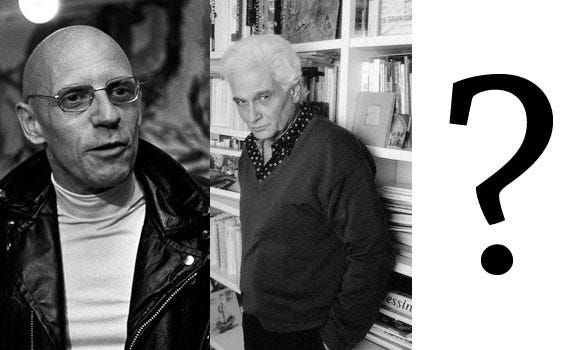
Oddly enough, the two philosophers discussed by Chomsky in some detail (although not in much detail) aren’t deemed by the Academic Experts to be postmodern philosophers at all. Jacques Derrida is usually classed as a “poststructuralist” or “deconstructionist”, and Michel Foucault is classed as… well, I’ve never been sure about this. (At first, Foucault was a structuralist, then a post-structuralist, then a “theorist”, then...) The philosophers who do fit the description “postmodern philosopher” are people like Jean-François Lyotard and Jean Baudrillard. (I suspect that at least some Academic Experts may dispute that too.)
So, as no doubt Chomsky himself would argue, these distinctions don’t matter that much (or even at all) to anyone on the outside.
As already stated, Chomsky includes Derrida’s work under the classification “postmodern philosophy”. This is hardly surprising if we take Chomsky at his word when he repeatedly says that he simply didn’t understand much of this “postmodern” stuff. Thus, if Chomsky didn’t understand much of this stuff, then he was hardly likely to make the fine and technical distinctions that Academic Experts make.
Chomsky has mentioned other Big Names in passing.
For example, he said that Jacques Lacan was “an amusing and perfectly self-conscious charlatan”, that Julia Kristeva “was a fervent Maoist”, and that he “just [doesn’t] understand” Stalinists like Louis Althusser. (Chomsky admitted — if that’s the right word — to “not understanding ‘dialectics’”.)
Chomsky on Derrida and Deconstruction
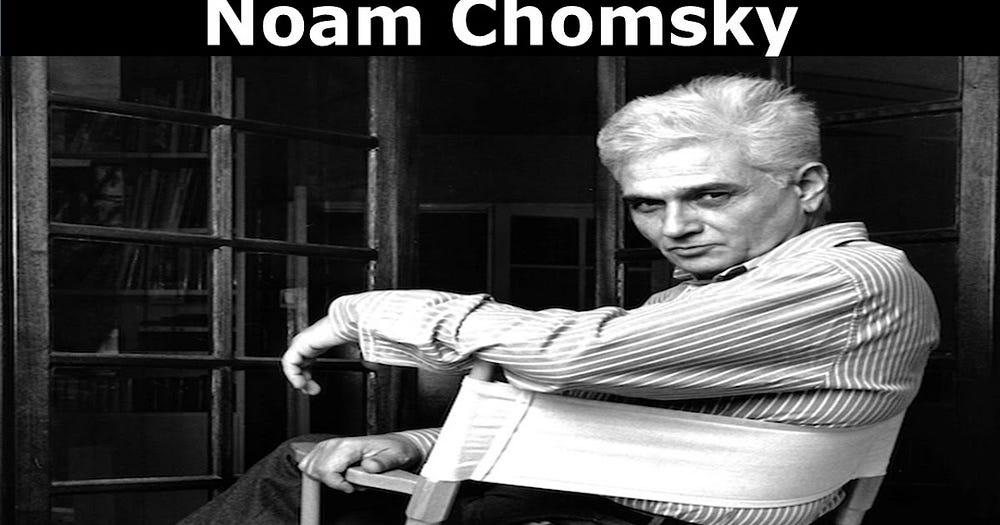
Whereas Chomsky had a small amount of time for Michel Foucault (see later), he had no time at all for Jacques Derrida.
The following is how Chomsky introduced Derrida to his audience:
“So take Derrida, one of the grand old men. I thought I ought to at least be able to understand his Grammatology, so tried to read it. I could make out some of it, for example, the critical analysis of classical texts that I knew very well and had written about years before. I found the scholarship appalling, based on pathetic misreading; and the argument, such as it was, failed to come close to the kinds of standards I’ve been familiar with since virtually childhood [].”
Chomsky wasn’t simply against Derrida’s pretentiousness: he was against Derrida’s writings and philosophies for political reasons.
Chomsky summed his position up in this way:
“There is no effort that I am aware of to make [postmodern philosophy] intelligible to the great mass of the population. [] And I’m also aware of no effort to show how it applies to anything in the world [].”
What’s more, this lack of political impact and relevance goes alongside such (as it were) bourgeois professors and academics making lots of cash from their sexy and titillating philosophies, as well as being able to enlarge and secure their career and academic fiefdoms.
Chomsky continued:
“Since I don’t happen to be much interested in the ways that intellectuals inflate their reputations, gain privilege and prestige, and disengage themselves from actual participation in popular struggle, I don’t spend any time on it.”
Again, Chomsky’s problem with postmodern philosophy was almost entirely political.
It’s hard to find stuff in which Chomsky goes into much detail about all this. However, the American philosopher Thomas A. McCarthy did go into detail, and what he said perfectly captures what Chomsky (usually) only hinted at.
Thomas McCarthy believed that the pretentious prose was — at least partly — a result of a philosophical position on language itself. This ended in philosophies which McCarthy — just like Chomsky — saw as being politically impotent.
McCarthy argued that only a “shared language” — the language that deconstruction rejected and/or deconstructed — can liberate the Other. As McCarthy himself put it:
“Deconstruction can hardly give voice to the excluded Other. The wholesale character of its critique of logocentrism deprives it of any language in which to do so.”
All this explains why Derrida (or deconstruction) couldn’t even hint at anything directly political in any traditional (or understandable) sense. Hence the ineffable, obscure and pretentious prose.
This is McCarthy again with a passage which is very Chomskian in timbre:
“Is it [] merely by accident that [Derrida’s] writings contain little analysis of political institutions and arrangements, historical circumstances and tendencies, or social groups and social movements, and no constructions of right and good, justice and fairness, legitimacy and legality?”
Here’s the problem.
Isn’t it the case that ‘legality’, ‘legitimacy’, ‘fairness’, ‘justice’ — and all the other political and philosophical words/concepts referred to by McCarthy — are examples of the transcendental signified in Derrida’s book (or in his “text”)? Thus, Derrida’s only interest in political and philosophical words and concepts was to violently deconstruct them. Indeed, if he hadn’t done that, then Derrida simply wouldn’t have been Derrida. (This is, of course, denied by many “Derrida scholars” and fans, who use Derridean “play” in their denials too.)
Ironically, perhaps all that was the main reason why Derrida only started to wax lyrically (at least in a clear way) about Karl Marx, “revolution”, “liberation”, “capitalism”, “Justice”, etc. very late in his life. (Derrida did attend demos, etc. before that, and his fans and supporters argue that he was always political.) More specifically, Derrida wrote his Specters of Marx in 1993 — some 40 or more years after he first started writing philosophy.
This book — or at least this period — can therefore be seen as Derrida’s “political turn”.
[Incidentally, Specters of Marx was published before most of Chomsky’s own criticisms quoted in this essay — i.e., in 1993. Chomsky’s own words are from the period 1996 to 2011.]
Derrida’s Prose Style
In terms of personal details.
For years, I felt almost guilty for not understanding Derrida. Indeed, I actually believed I might be philosophically — even educationally -subnormal! That was the case even though I’d been reading philosophy for some years when I first failed to understand Derrida. What’s more, I’d read some of the simpler explanations of Derrida’s ideas… and yet I still didn’t understand him when I read his own words.
[Of course, there was never any guarantee that these simpler explanations of Derrida’s philosophy were correct, or that Derrida himself — as well as his academic fans — would be happy with any of them. Indeed, both Derrida and many of his academic acolytes severely reproached the (what they called) “misreadings” of his work… Thus, the play goes on.]
So what about Chomsky?
Chomsky himself didn’t have my own qualms about Derrida. He called a spade a spade.
In simple terms, Chomsky called Derrida’s work “gibberish”.
However, he did at least raise the possibility of being philosophically — or even educationally — subnormal too when he said his criticisms may be “just another sign of my incapacity to recognize profundities”. Of course, Chomsky immediately dismissed this possibility.
The following is one of Chomsky’s explanations of the situation:
“There are lots of things I don’t understand — say, the latest debates over whether neutrinos have mass or the way that Fermat’s last theorem was (apparently) proven recently. But from 50 years in this game, I have learned two things: (1) I can ask friends who work in these areas to explain it to me at a level that I can understand, and they can do so, without particular difficulty; (2) if I’m interested, I can proceed to learn more so that I will come to understand it.”
It seems, then, that these strategies didn’t work for Chomsky when it came to postmodern philosophy; and, specifically, when it came to Derrida’s work.
So is postmodern philosophy and Derrida’s work technical in a way that even transcends particle physics and metamathematics?
Perhaps.
Take the case of Professor Christina Howells (at the University of Oxford).
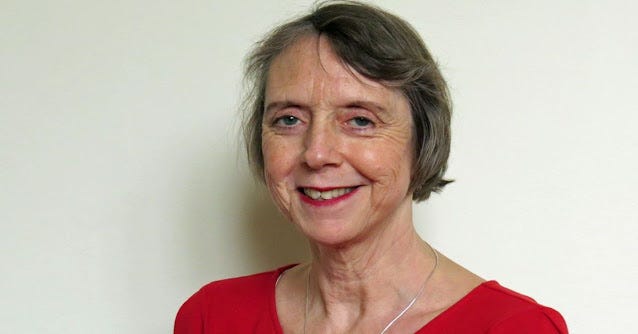
Professor Howells once argued that the pretentiousness of deconstruction (specifically Derrida) is actually required. It is essential. Of course, she didn’t put it that way. Instead, she claimed deconstruction is a “technical” discipline.
In Professor Howells’s own words, Derrida claimed that he had created
“a specific type of philosophy, and it was technical, and there was no reason why anyone reading it should immediately understand it, anymore than they would any other specialised, technical language”.
This shows that “technical language” (as it were) in itself is relevant here.
Howells also says that
“there is a risk of [analytic philosophers] transforming [continental] philosophers into something they’re not, and making them say something they weren’t saying”.
Why is that?
Howells believes that it’s because
“we’d loose much of the specificity that way, and you could we be left with banality”.
Howells then went on to say that
“when you extract from a long elaborated discussion a kernel which is then acceptable to analytic philosophy, whether it is about being with others, or about what Derrida might mean by différance, if he were prepared to express it quite differently, you’ve lost too much”.
Here Howells is primarily talking about how (specifically) analytic philosophers have read (or “used”) the works of Derrida. Thus, Howells said that she’s not
“very keen on the idea of transforming Derrida into terms that analytic philosophy can cope with and use”.
As Chomsky would have argued, this isn’t really about translating Derrida’s writings and ideas into something that analytic philosophers “can cope with and use”. It’s about translating Derrida’s writings and ideas into any other kind of prose.
Of course people don’t “immediately understand” Derrida’s writing style because it can be argued that the French philosopher went out of his way to make sure that people didn’t immediately — if at all — understand it. Moreover, it can easily be argued that this wasn’t entirely down to Derrida’s prose being a “specialised, technical language” either.
Professor Howells’s words above are also an explicit endorsement of elitism — if only an academic kind of elitism.
In any case and as already hinted at, Professor Howell’s personal problems with analytic philosophy are largely irrelevant to the issues discussed by Chomsky. That’s the case because hardly anyone (again, as Chomsky argued) understands the kind of “continental philosophers” Howells champions. What’s more, that fact also applies to the many highly-educated people who’ve attempted to understand Derrida and other postmodern philosophers (i.e., most of whom are completely unconnected to analytic philosophy).
Let’s return to Chomsky.
Readers may wonder if Professor Howells would also apply her stern words about analytic philosophers to Chomsky’s criticisms of Derrida and postmodern philosophy.
In any case, Chomsky said:
“Just restate the results to me in plain words that I can understand, and show why they are different from, or better than, what others had been doing long before and and have continued to do since without three-syllable words, incoherent sentences, inflated rhetoric that (to me, at least) is largely meaningless, etc.”
These plain renditions of supposedly profound postmodern philosophy, Chomsky added, may “cure [his] deficiencies — of course, if they are curable; maybe they aren’t”.
Chomsky also made the point that that postmodern philosophers make
“lots of statements that are trivial (though dressed up in complicated verbiage) or false; and a good deal of plain gibberish”.
Many other commentators have also accused these postmodern philosophers of hiding mundane or trite ideas under pretentious prose. Some have even argued that (as it were) nothing is hidden because there’s nothing to hide. Or, as Professor Hugh Mellor said about Derrida specifically, this stuff is “bullshit”.
Mellor also wrote the following words on Derrida:
“That is much latter work which seems to be wilfully obscure. If you spell out these later doctrines plainly, it becomes clear that most of them, if not false, are just trivial.”
Mellor then added that Derrida “goes in for mystery-mongering about trivial truisms”. That said, just before those words, Mellor had also admitted that “some of Derrida’s early work was interesting and serious”. However, he added that “this isn’t the work he has become famous for”.
Yet Chomsky himself seemed to have accepted that technical language is sometimes required — as we all do! However, this still isn’t an excuse for postmodern philosophers “to resort to obscure and needlessly complex verbiage and posturing”. Chomsky then told his audience that he’d never had any problems when he spoke “to people lacking much or sometimes any formal education”.
Chomsky on Foucault
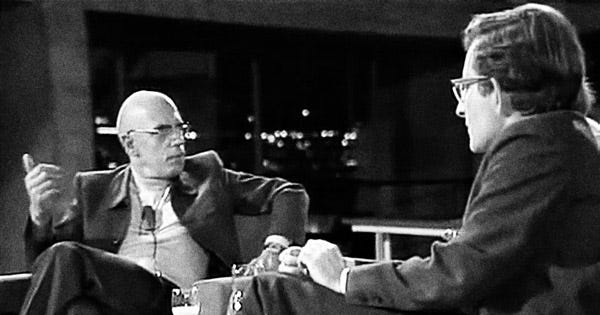
Noam Chomsky did have at least some time for Michel Foucault… but not much.
Firstly, Chomsky told us that he “knew and liked” Foucault, and deemed him to be “somewhat different from the rest”. Chomsky also said that he had a
“several-hour discussion [with Foucault], which is in print, and spent quite a few hours in very pleasant conversation, on real issues, and using language that was perfectly comprehensible — he speaking French, me English”.
Chomsky added that he “find[s] at least some of what [Foucault] writes intelligible”. However, what Chomsky gave, he then immediately took back by saying that although some of Foucault’s stuff is “intelligible”, it’s still “generally not very interesting”.
Politically speaking, however, Chomsky added that Foucault wasn’t
“personally disengaged and did not restrict himself to interactions with others within the same highly privileged elite circles”.
John Searle and Michel Foucault

The American analytic philosopher John Searle, just like Chomsky, also classed himself as a friend of Foucault. And they too discussed Parisian pretence.
So, firstly, take Chomsky’s words:
“As to ‘posturing,’ a lot of it is that, in my opinion, though I don’t particularly blame Foucault for it: it’s such a deeply rooted part of the corrupt intellectual culture of Paris that he fell into it pretty naturally, though to his credit, he distanced himself from it.”
Now take the following debate between Searle and Foucault.
Searle commented on this issue in a seminar he gave in which he referred to Foucault (whom he classed as a “good friend”). This is Searle’s account of the conversation:
Searle: “Why the hell do you write so badly?”
Foucault: “Look. If I wrote as clearly as you do, people in Paris wouldn’t take me seriously. They’d think that I was childlike. Naive.”
Searle went on to say:
“You’ve got to be 10% incomprehensible otherwise people won’t think it’s deep. They won’t think you’re a profound philosopher.”
That passage explains much about postmodern philosophy’s pretentiousness. What’s more, according to Chomsky, it also — at least in part — explains postmodern philosophy’s political impotency.
Notes:
(1) I wonder what William F. Vallicella thinks of Noam Chomsky’s harsh criticisms of postmodern philosophy. (Does Chomsky also have a “shallow pate”?) I ask that because they’re very similar to those of analytic philosophers (apart from the strong political component). Sure, Vallicella actually used the broader term “Continental philosophy”, not “postmodern philosophy”. However, no analytic philosopher has ever been against a philosopher simply because he happens to live on the Continent (as Wittgenstein, Carnap, Husserl, Frege, Kant, etc. did). Rather, analytic philosophers usually had a very specific subset of Continental philosophers in mind — those people Chomsky classified as “postmodern philosophers”.
So what did Chomsky think of analytic philosophy?
The following is a very relevant passage from Chomsky:
“[I]t’s not necessarily a criticism to say that something doesn’t make sense: there are subjects that it’s hard to talk sensibly about. But if I read, say, Russell, or analytic philosophy, or Wittgenstein and so on, I think I can come to understand what they’re saying, and I can see why I think it’s wrong, as I often do. But when I read, you know, Derrida, or Lacan, or Althusser, or any of these — I just don’t understand it.”
(2) Theory
Noam Chomsky had an almost positivist idea of what a theory should be — and that included political theories too.
Chomsky said that a theory should be — or at least it must become — “well tested and verified”. That is, a theory should
“appl[y] to the conduct of foreign affairs or the resolution of domestic or international conflict, rather than simply remain as pseudo-scientific posturing”.
What’s more, the “little” parts of postmodernism which are
“sometimes quite interesting [still] lack [] consequences for the real world problems that occupy my time and energies”.
I used the word “positivist” semi-ironically because postmodern philosophers tended to have a deep disdain for what what they sneeringly called positivism. Of course, Chomsky seemed to be referring to what is only really true of theories in physics, biology, chemistry, etc. The question is, then, whether all this can also pass neatly over to political theories. What’s more, were postmodern philosophers — at least the ones Chomsky was criticising — even claiming to offer (strictly speaking) political theories in the first place?
My flickr account and Twitter account.











No comments:
Post a Comment